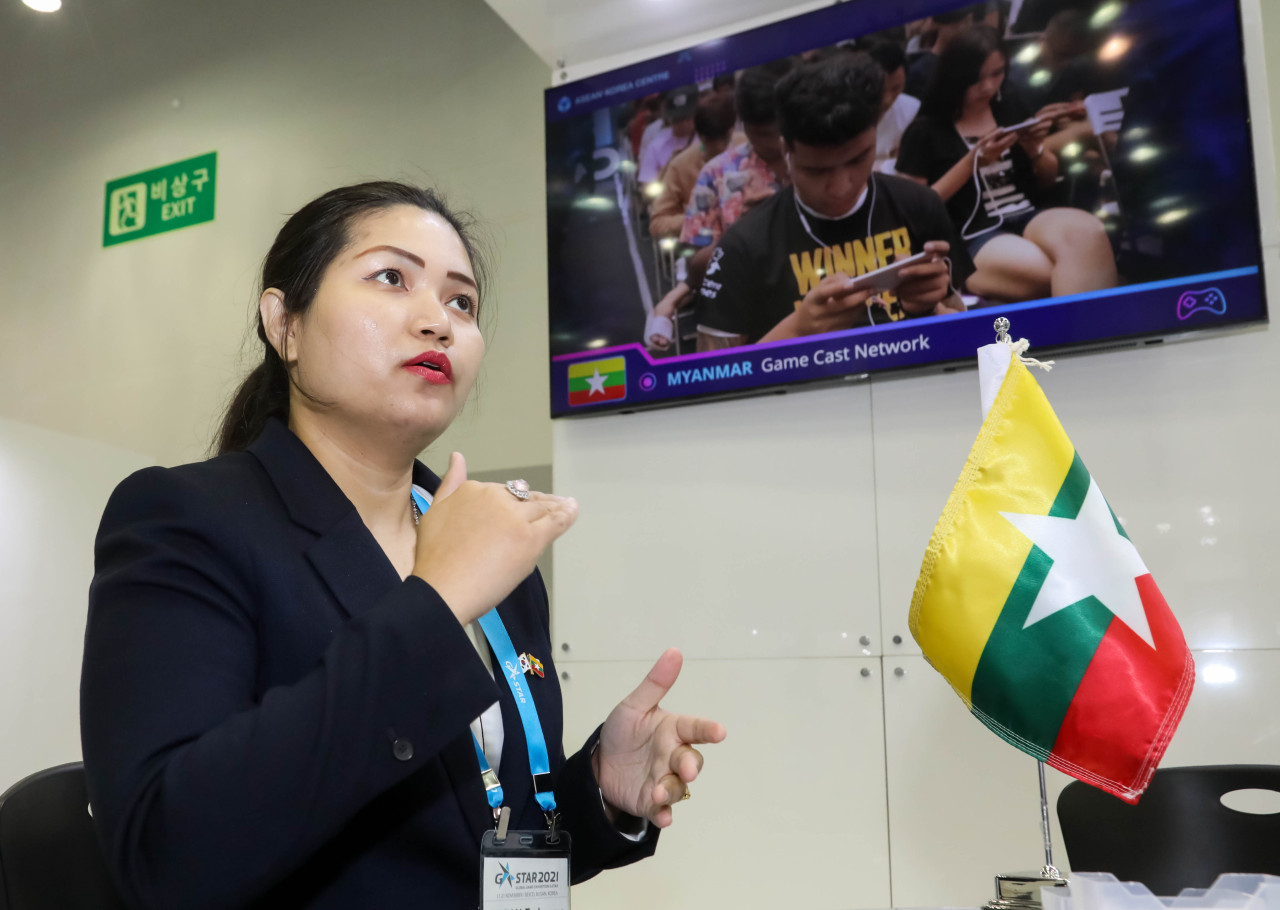
Win Pa Pa Thu, Economic counselor at the Myanmar Embassy speaks during an interview The Korea Herald at the Bexco exhibition center in Busan.(ASEAN-Korea Center)
Win Pa Pa Thu, economic counselor at the Myanmar Embassy
KH: What drew you to G-Star 2021?
Win: Myanmar participated in G-Star 2021 as part of the ASEAN-Korea Center to connect Myanmar and Korean game developers and the industry for business cooperation, sharing knowledge and business trends.
KH: How can G-Star 2021 help companies from ASEAN and Korea?
Win: Myanmar game developers and game companies can learn the current market trends not only in Korea but also worldwide via the game capacity building workshop organized by ASEAN-Korea Center. ASEAN game companies could set up business meetings with Korea’s game companies through this trade fair as an effective platform to access not only the Korean game industry but also international markets.
KH: What can Korea offer ASEAN’s digital ecosystem?
Win: ASEAN is a highly diverse region. Korea is striving to upgrade into the Fourth Industrial Revolution digital era. ASEAN and Korea partnered in a plethora of digital and technological initiatives. Korea contributed various IT knowledge sharing programs and supported ASEAN’s Smart Cities Network in promoting smart and sustainable urban development.
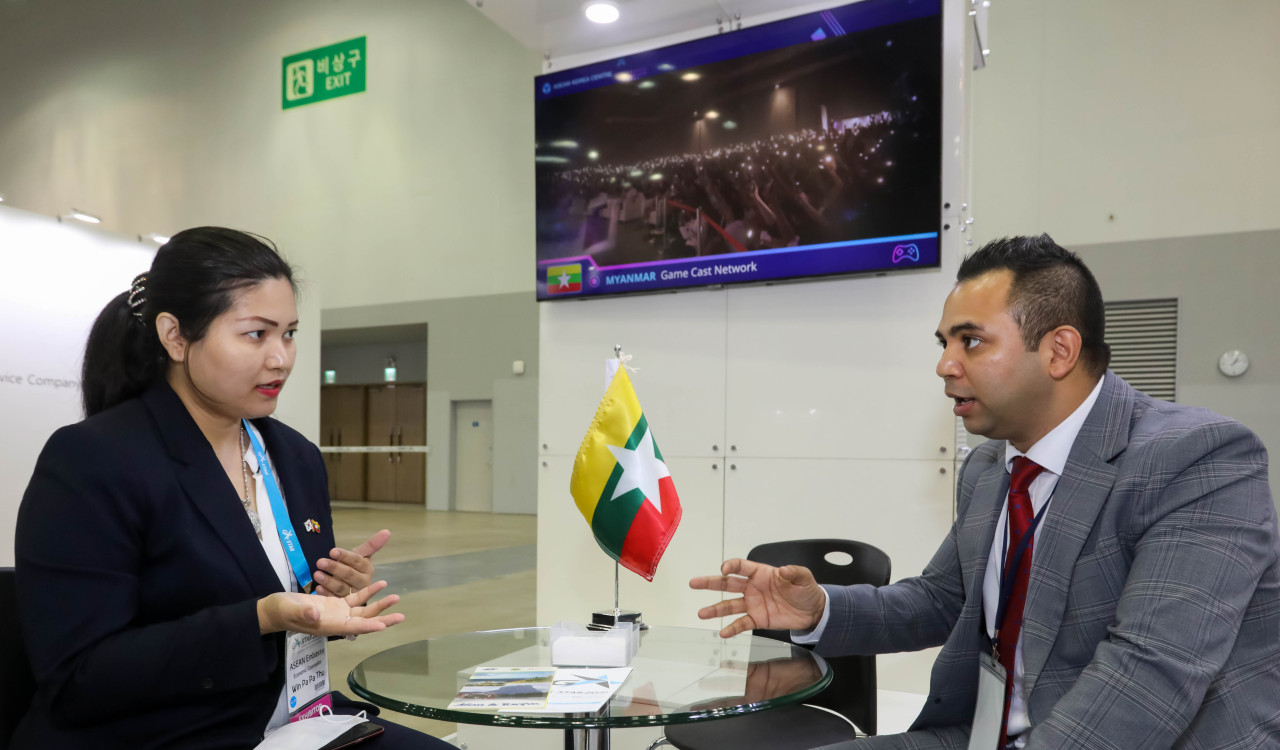
Win Pa Pa Thu, Economic counselor at the Myanmar Embassy discussing business opportunities in Myanmar during an interview with The Korea Herald at the Bexco exhibition center in Busan.(ASEAN-Korea Center)
KH: What would you like to suggest to Myanmar and Korean companies to expand business outreach?
Win: Connection, response and competitiveness play a vital role in business to advance prolific results. I suggest ASEAN and Korean companies to connect with commercial sections of embassies in Seoul to bolster business through trading partners and organizations like the ASEAN-Korea Center, Korea International Trade Association, Korea Trade-Investment Promotion Agency and expand business outreach in the ASEAN-Korea region.
KH: Any suggestions on creative economy sector cooperation?
Win: The creative economy between ASEAN and Korea has a huge potential to boost trade relations. ASEAN applauds President Moon Jae-in’s New Southern Policy Plus that covers almost every sector to create a strong foundation with mutual benefits and sustainable development. ASEAN and Korea are family members of the Regional Comprehensive Economic Partnership. Small and medium enterprises are core catalysts for Myanmar’s economic development. That’s why the Myanmar Embassy in Seoul dynamically supports SMEs and startups in ASEAN and Korea and vice versa, and collaborates with ministries and business organizations in Korea to access international markets. Korea’s game industry is well developed, Myanmar game developers can learn and achieve win-win cooperation.
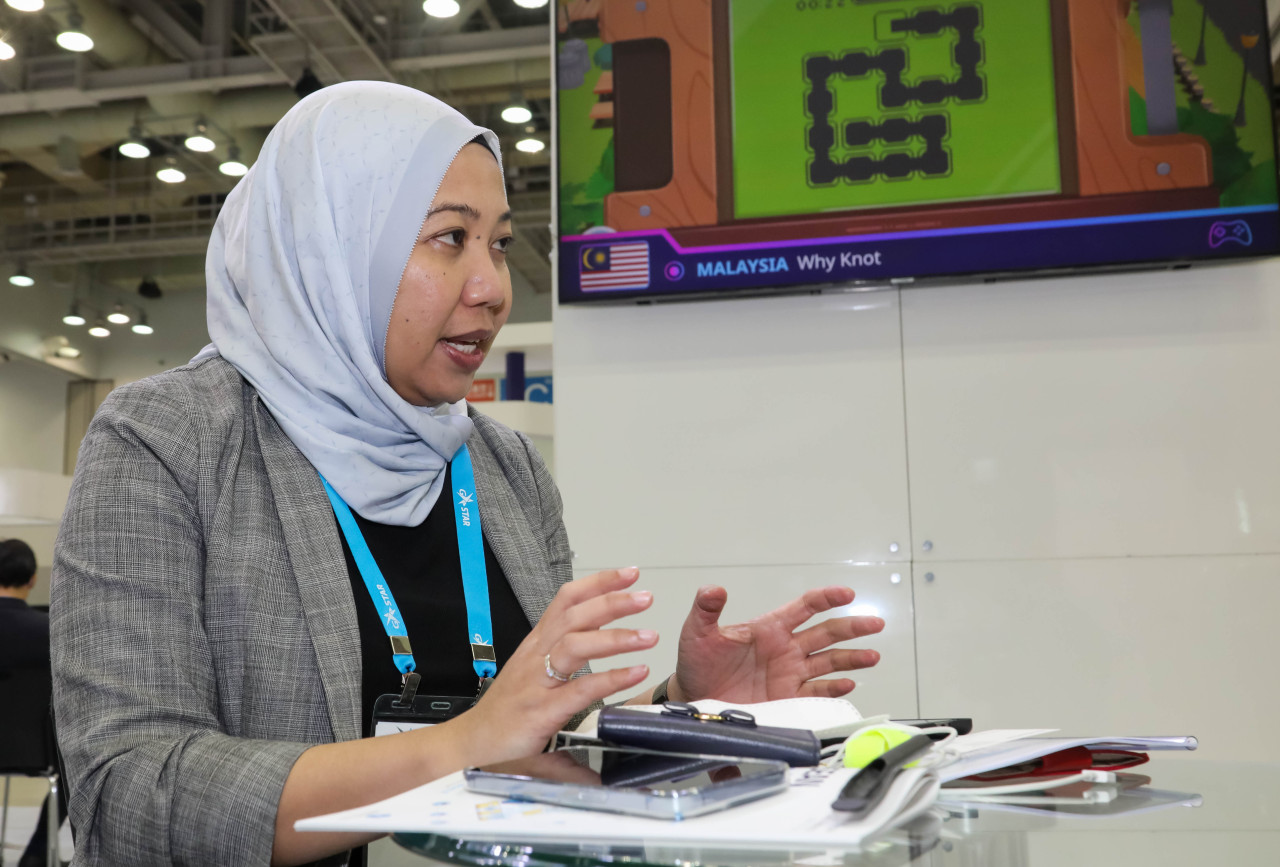
Norharliza Mohamad Yunos, Trade Commissioner at Malaysia External Trade Development Corp. / Trade Counselor of The Embassy of Malaysia. (ASEAN-Korea Center)
Norharliza Mohamad Yunos, Trade Commissioner, Malaysia External Trade Development Corp./ Trade Counselor of the Embassy of Malaysia
KH: What drew you to G-Star 2021?
Yunos: Twelve Malaysian companies, mostly game developers, an esports agency and a publisher, participated to showcase Malaysian games to the Korean market. ... G-Star is an excellent platform for SMEs and startups from both countries to access each other’s industries, and a way to find potential associates, since the majority of active market players participate.
KH: How can G-Star 2021 help companies from ASEAN and Korea?
Yunos: The hybrid format show offered Malaysian game companies an opportunity to share knowledge, penetrate into Korean market and find potential partners to co-produce ongoing and future games.
KH: What can Korea offer ASEAN’s digital ecosystem?
Yunos: Korea’s New Southern Policy declared in 2017 and support through official development assistance projects to six key ODA cooperation partners in ASEAN excluding Malaysia, Singapore, Brunei and Thailand is promoting the expansion of digitalization projects in ASEAN region. According to the Korean government’s third comprehensive plan for the International Development Cooperation 2021-2025 released in January 2021, Korea is to provide high value-added infrastructure projects such as ICT technology-based transportation systems and the establishment of Intelligent Traffic Management System, railway signal system and Group Rapid Transit system for express buses to six ASEAN countries. Furthermore, urbanization and smart city projects will be promoted in five ASEAN countries as a follow-up measure of the memorandum of understanding on development cooperation signed with Cambodia, Laos, Myanmar, the Philippines and Vietnam in November 2019.
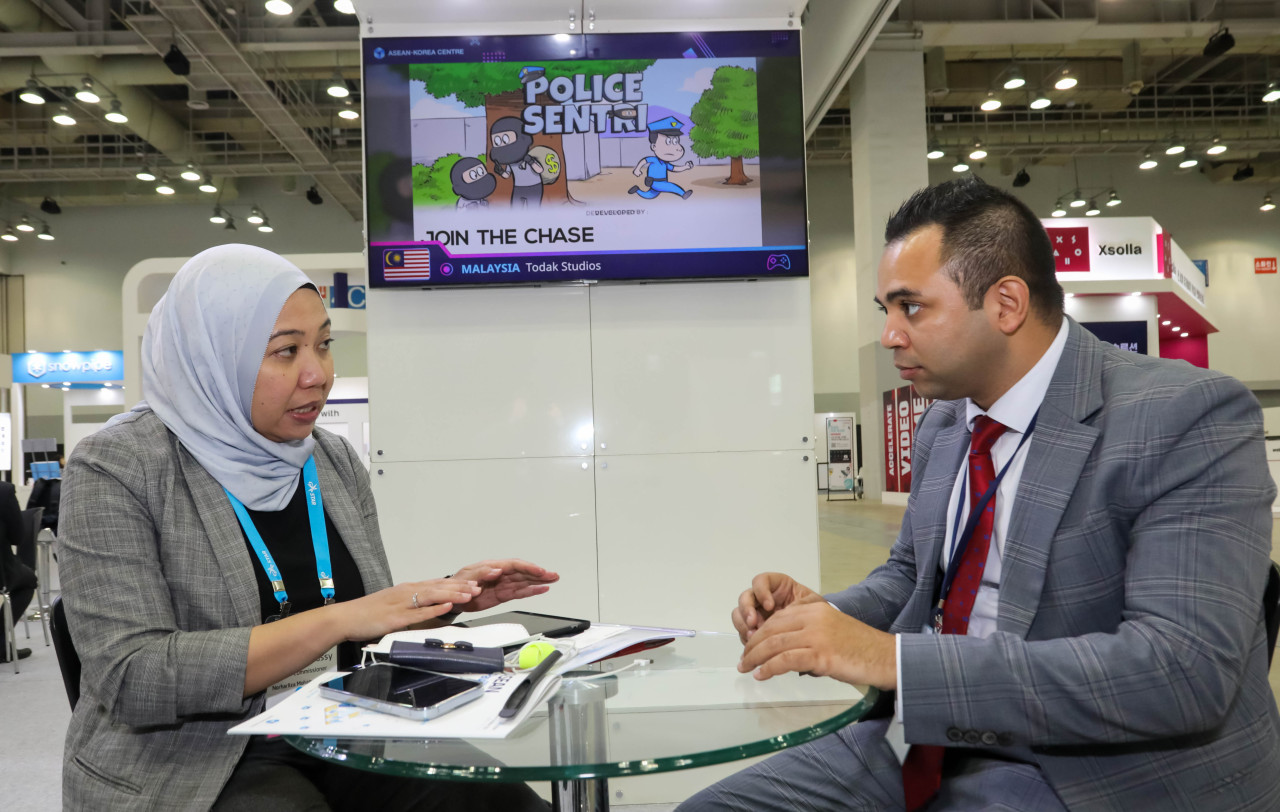
Norharliza Mohamad Yunos, Trade Commissioner at Malaysia External Trade Development Corp. / Trade Counselor of The Embassy of Malaysia explaining ASEAN-Korea Center role during an interview The Korea Herald at the Bexco exhibition center in Busan.(ASEAN-Korea Center)
KH: How is the ASEAN-Korea Center expanding business networks between ASEAN and Korea?
Yunos: Trade promotion events held by the ASEAN-Korea Center helped Malaysian companies to enhance business opportunities, establish new business contacts and network with potential buyers. MATRADE (the Malaysia External Trade Development Corp.) participated in food-related exhibitions and creative content-related events organized by ASEAN-Korea Center in 2021 that promoted Malaysian goods. The Malaysia External Trade Development Corp. was established on March 1, 1993, as the external trade promotion arm of Malaysia’s Ministry of International Trade and Industry. Thirty-four Malaysian companies made new contacts with the Korean buyers either by displaying sample products or through online B2B meetings in a year.
KH: What would you suggest companies from Malaysia and Korea do to expand business outreach?
Yunos: Participate in B2B video conferences arranged by MATRADE, identify accurate market information and find reliable partners. Malaysian exporters and Korean importers spend time and efforts finding market insights, reliable and competitive prices. Companies can consult with MATRADE for accurate market information and matching services.
KH: Any suggestions on creative economy sector cooperation?
Yunos: Creative economy sector between Malaysia and Korea needs collaboration.
Korea is an export-oriented nation, and a growing number of Korean manufacturers have been seeking to penetrate new halal markets and creative business opportunities. Malaysia has a leading halal industry with well-known halal certification body called Department of Islamic Development Malaysia -- the agency responsible for the Islamic affairs including halal certification in Malaysia. Halal is a prospective creative economy (industry). MATRADE’s international sourcing program in conjunction with Malaysia International Halal Showcase’s annual event is a prospect for Korean buyers to source Halal products from Malaysia. Collaboration of Malaysian and Korean SMEs and startups, co-production and co-development, and reliable publishers from Korea would help Malaysian game developers to penetrate Korean market and vice versa. MATRADE Seoul welcomes Korean game companies looking for Malaysian games, game developers, esports agencies and publishers.
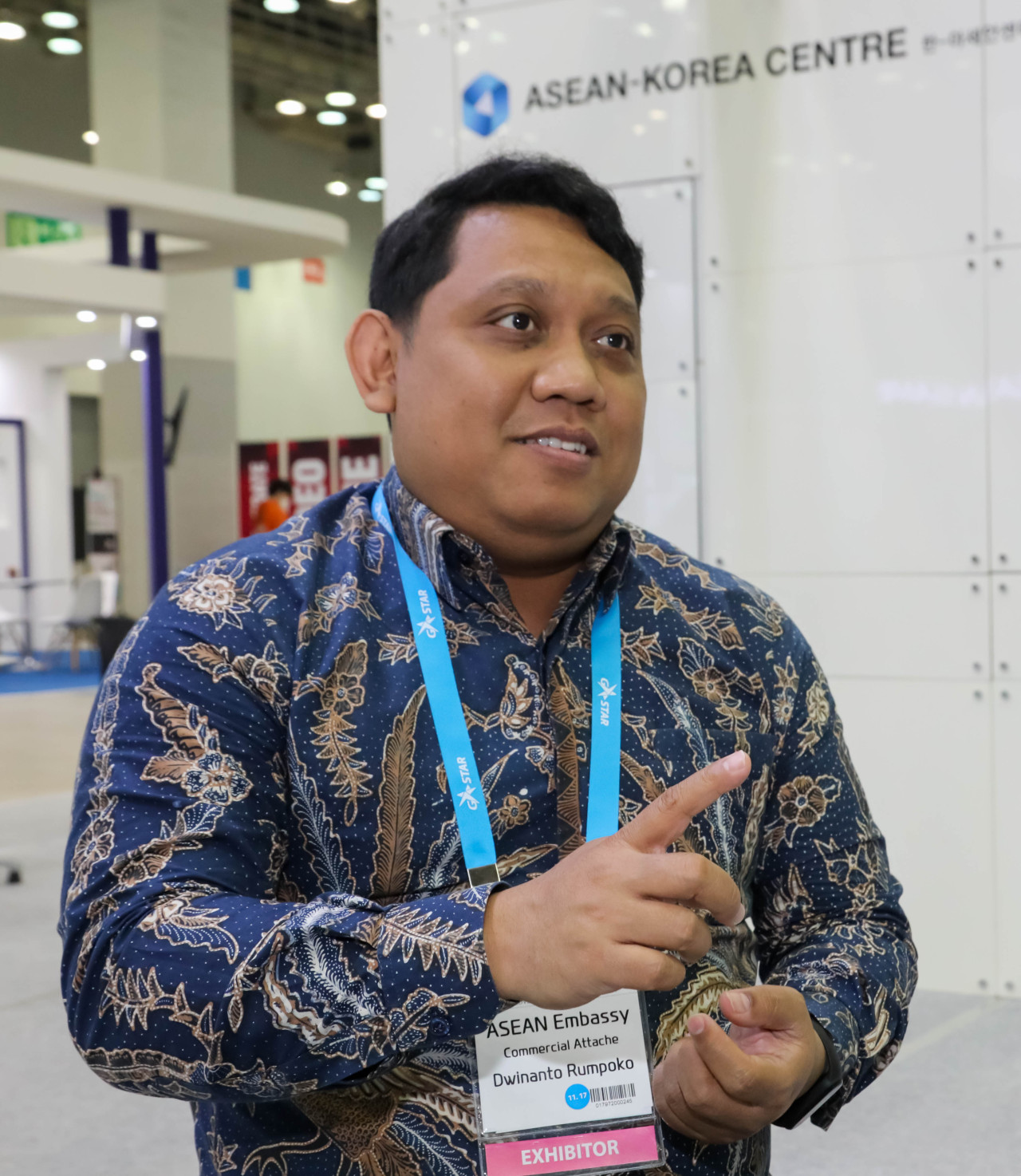
Dwinanto Rumpoko, Commercial attache at the Indonesian Embassy speaks during an interview The Korea Herald at the Bexco exhibition center in Busan.(ASEAN-Korea Center)
Dwinanto Rumpoko,
Commercial attache at the Indonesian Embassy
KH: What drew you to G-Star 2021?
Rumpoko: G-Star 2021 would introduce the Indonesian game and animation industry to the world through Korea’s G-Star 2021. We want to play the next step as developer, creator, outsourcing (provider) and also publisher, in collaboration with Korean companies. G-Star 2021 is the largest global game exhibition in South Korea and already on the radar of big companies in IT and gaming. This year we hope that we can get a positive outcome because (there are) 10 impressive companies from Indonesia with lots of talent in the gaming industry.
KH: How can G-Star 2021 help companies from ASEAN and Korea?
Rumpoko: I believe now Korea is looking forward to … (working) together with ASEAN to develop a new, global form of entertainment industry.
KH: What can Korea offer ASEAN’s digital ecosystem?
Rumpoko: Korea’s New Southern Policy focusing on ASEAN countries as partners in business will boost collaboration between ASEAN and Korea. Korea’s digital ecosystem is unique. ASEAN can adapt the digital market in every single aspect like consumer products, digital media, e-commerce, influencer marketing, and many more.
KH: What would you suggest Indonesia and Korea do to expand business outreach?
Rumpoko: Assisting companies, especially SMEs, in exporting products to Korea, knowing the market and giving support to allow domestic platforms to match (them) up with overseas buyers would be useful.
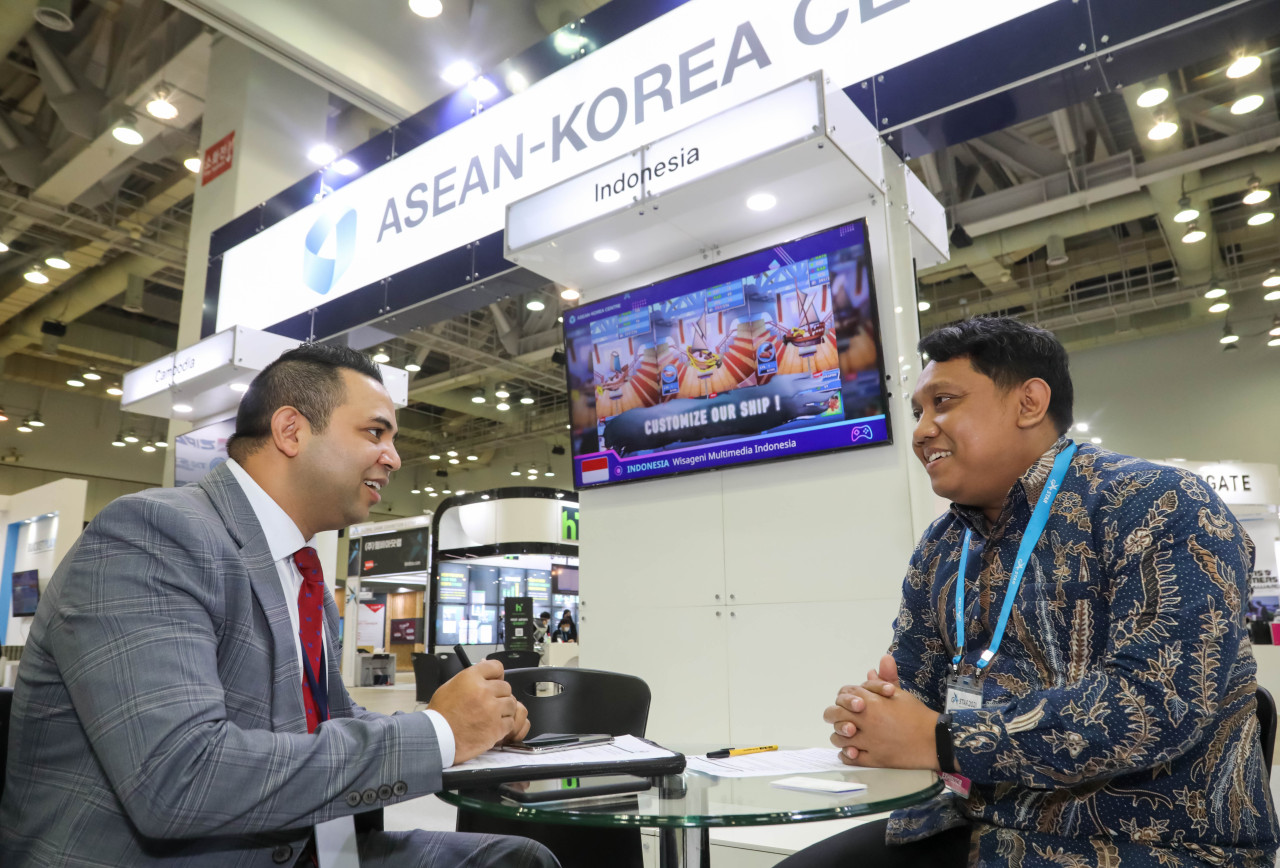
Dwinanto Rumpoko,Commercial Attache at the Indonesian Embassy quotes former ambassador Umar Hadi saying " Think Big, start small and move fast" during an interview with The Korea Herald. (ASEAN-Korea Center)
KH: Any suggestions on creative economy cooperation?
Rumpoko: Innovation is key to expand business, don’t just be a follower, you have to be the innovator. I quote former Ambassador Umar Hadi who said “Think Big, start small and move fast.” We need commitments from the government and private sector to present readiness of creative economy in ASEAN and Korea. Partnerships will further enhance ASEAN and Korea companies to make creative industries a significant economic contribution to economy. Sectors such as film, IT, animation, games etc., have potential for cooperation and future prosperity. Individual event promotion to create awareness of SMEs, startups in Korea, one-on-one business matching and regular visits to associations and new updates for the business would prove effective.
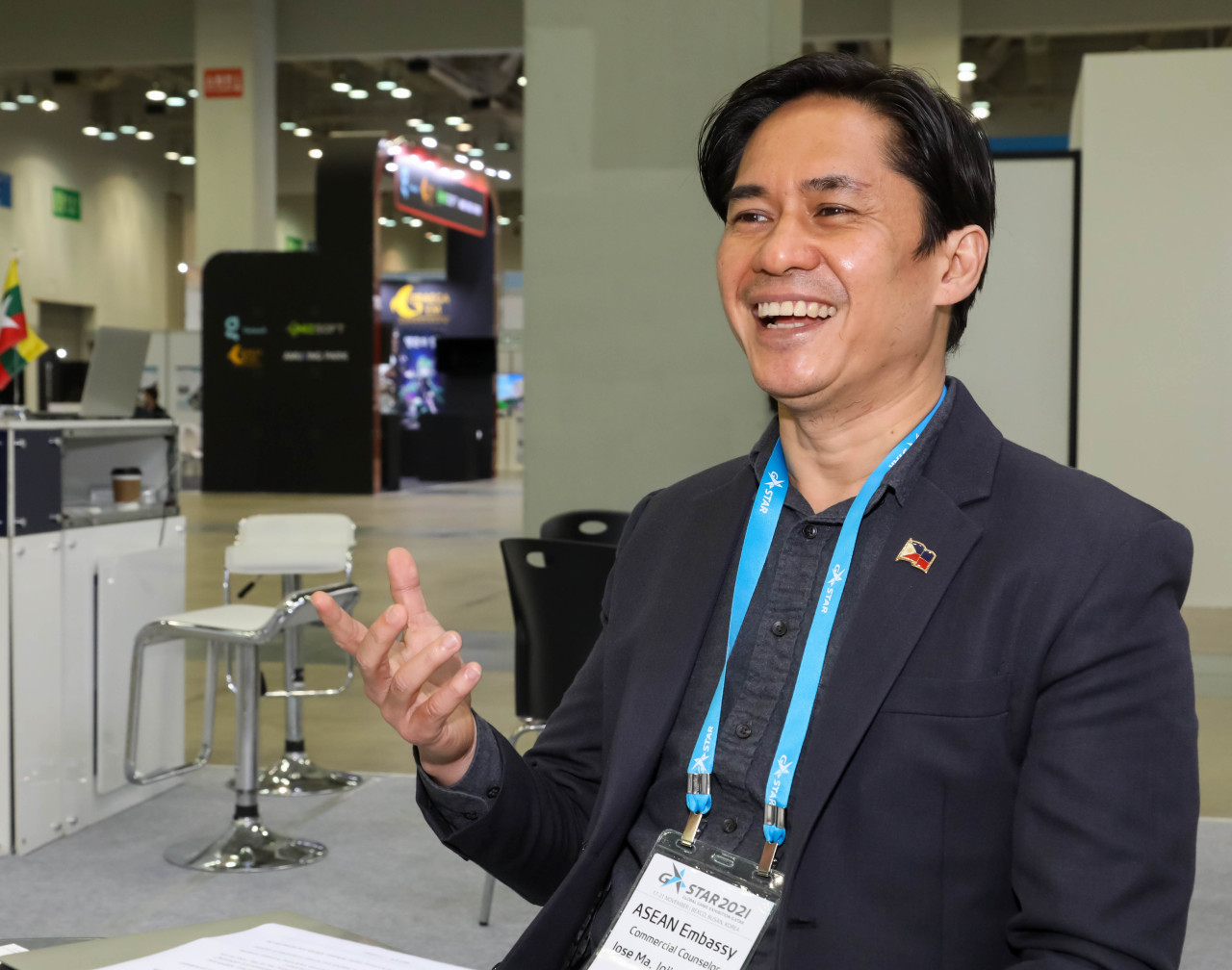
Jose Ma. Jojie S. Dinsay, commercial counselor at the Philippine Trade and Investment Center (ASEAN-Korea Center) speaks with The Korea Herald at the Bexco exhibition center in Busan.(ASEAN-Korea Center)
Jose Ma. Jojie S. Dinsay
Commercial counselor at the Philippine Trade and Investment Center
KH: What drew you to G-Star 2021?
Dinsay: To promote a source of exports for products and services in Korea, look for Korean companies to invest in the Philippines and showcase capabilities of the Philippines in terms of game development. From programming up to publishing, many global companies outsourced services in Philippines, we’re seeking partners who can publish games in Korea and outsource few activities in the Philippines such as art and support services -- strength of the Philippines.
KH: How can G-Star 2021 help companies from ASEAN and Korea?
Dinsay: The show is biggest in the world in terms of game development and game publishing. Our participation will introduce different opportunities for companies (who want to) know more about the creative sector not only in the Philippines, but in other ASEAN countries also. Game development and animation is still a growing sector in most of ASEAN countries, unlike Korea, that will need support of Koreans, Korean government and Korean companies for growth.
KH: What can Korea offer ASEAN’s digital ecosystem?
Korea has smart infrastructure and development, the smart cities with digital connections and IoT. Philippines is currently building New Clark City, a smart city, with the participation of Korean companies. Another example is a smart city in Pampanga through the Ministry of Land, Infrastructure and Transportation. Philippines has a “Build, Build, Build” program to connect islands, many opportunities are underlying because Korean companies have strong digital infrastructure and services to offer. The “Build, Build, Build” program is the Duterte administration’s ambitious infrastructure development plan that is composed of thousands of projects to be implemented all over the country.
KH: How is the ASEAN-Korea Center expanding business networks between ASEAN and Korea?
Dinsay: The ASEAN Korea Center has numerous activities specific to animation and game development since 2018, like the Philippine-Korea Creative Industry Cooperation Forum in February 2020. Hopefully delegations from Korea will visit different ASEAN countries through the ASEAN-Korea Center in post COVID-19 to actualize business interests.
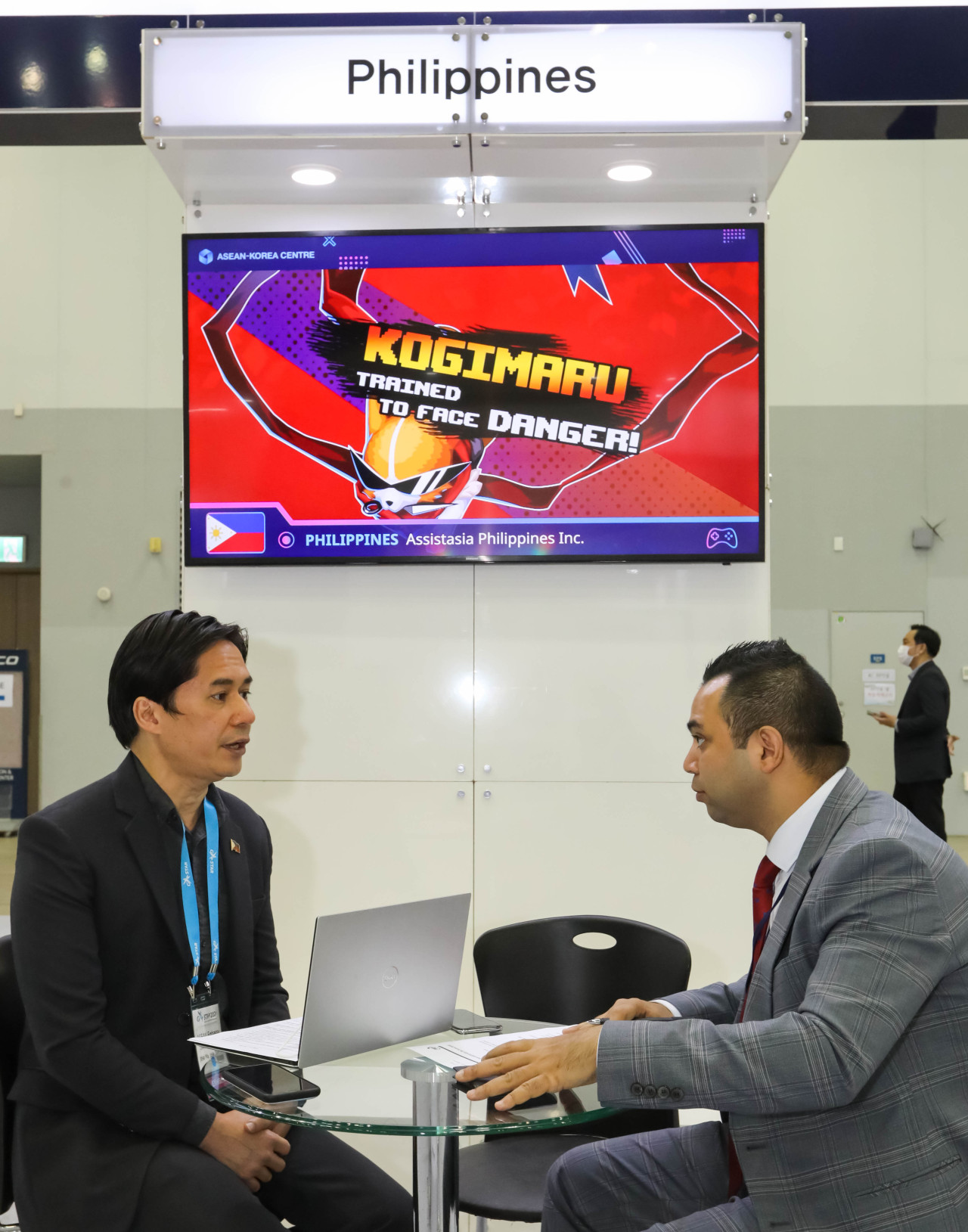
Jose Ma. Jojie S. Dinsay commercial counselor at the Philippine Trade and Investment Center (ASEAN-Korea Center)stressing on creative economy cooperation between ASEAN and Korea. .(ASEAN-Korea Center)
KH: What would you suggest Philippine and Korean companies do to expand business outreach?
Dinsay: Koreans should explore the Philippines, meet with the Philippine Trade and Investment Center. There are a lot of opportunities starting from sourcing of products and services to long-term investments. The key area Koreans are looking into is ingredients used for processing to put high-value products in Korea. Philippines is promoting healthy and natural food, wellness products and beauty products. Philippines can be one of the sources.
KH: Any suggestions on creative economy sector cooperation?
Dinsay: Speaking about creatives is not just about tech, what we lack … I think very important is service in translation to enter Korean market. If ASEAN-Korea Center’s help in this direction would be a starting point for our products like movies, animation cartoons, and webtoons. The Philippines is looking for possible partnerships with Korean companies in web development. We have a number of companies that have expressed interest and we hope that will be able to meet the contacts in Korea.








![[Herald Interview] 'Amid aging population, Korea to invite more young professionals from overseas'](http://res.heraldm.com/phpwas/restmb_idxmake.php?idx=645&simg=/content/image/2024/04/24/20240424050844_0.jpg&u=20240424200058)




